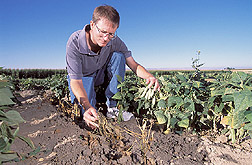This page has been archived and is being provided for reference purposes only. The page is no longer being updated, and therefore, links on the page may be invalid.
|
|
|
|
New Dry Edible Bean Resists Bacterial Disease
By Jan SuszkiwJune 29, 2007
A new germplasm line named "ABC-Weihing" is now available for breeding high-yielding varieties of great northern beans that can resist common bacterial blight.
Caused by the pathogen Xanthomonas campestris pv. phaseoli, bacterial blight is an endemic disease affecting bean crops east of the U.S. Continental Divide. Antibiotic treatment, clean-seed programs and sanitation are standard control measures. But crop resistance is the keystone defense, notes Phil Miklas, a geneticist in the Agricultural Research Service’s (ARS) Vegetable and Forage Crops Production Research Unit, Prosser, Wash.
In susceptible bean plants, disease symptoms include large brown blotches with lemon-yellow borders on leaf surfaces and small discolored seed in infected pods. Severe outbreaks can cause yield losses of up to 40 percent in susceptible crops.
Miklas and Carlos Urrea, a University of Nebraska (UN) bean breeder, developed ABC-Weihing using marker-assisted selection, a method of detecting inherited genes that is faster than conventional screening of plants for disease resistance and other traits. ABC-Weihing is the offspring of several crosses the scientists made, starting in 1997, between a Great Northern bean cultivar and "XAN 159," a germplasm breeding line.
In greenhouse tests, ABC-Weihing also resisted eight strains of bean rust, as determined by ARS plant pathologist Marcial Pastor-Corrales, ARS Vegetable Laboratory, Beltsville, Md., and all non-necrotic strains of bean common mosaic. ABC-Weihing's upright growth also helped protect it from soilborne assault by white mold.
Other features include white flowers that bloomed 45 days after planting and seed that was slightly larger than "Matterhorn," a commercial check variety used in trials in North Platte, Neb., Carrington, N.D., and elsewhere. In those tests, ABC-Weihing had an average seed yield of 1,869 pounds per acre versus 1,896 pounds per acre for Matterhorn.
Detailed information on ABC-Weihing will appear in an upcoming issue of Crop Science. Urrea is handling seed requests.
The United States is the sixth-leading producer of edible dry beans, generating farm sales of $451 million in 2001-03, according to the U.S. Department of Agriculture's Economic Research Service.
ARS is USDA’s chief scientific research agency.

